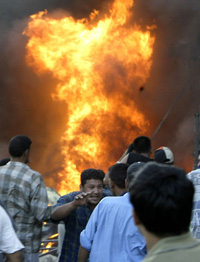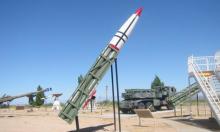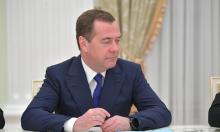Twelve killed in siucide bomber attack in Iraq

At least 12 people were killed by a female suicide bomber who exploded the offices of an anti-al-Qaida group that has joined forces with the U.S., police and the U.S. military said Friday.
It was the second suicide attack involving a woman in less than two weeks in one of Iraq's most violent provinces and one of many in recent months that have targeted the U.S.-backed groups, which are credited with helping stem Iraq's violence along with the influx of American troops.
Ten of those killed in the attack in the Diyala province city of Muqdadiyah were members of the local anti-al-Qaida group who have partnered with U.S. and Iraqi forces to rid their neighborhood of militants, said Brig. Gen. Mohammed al-Tamimi, the city police chief.
Al-Tamimi said 15 people were killed at least 20 people were injured. The U.S. military put the casualty toll at 12 people killed and 17 wounded, but the statement said there was no confirmation that any of the dead or wounded were part of the anti-al-Qaida group. About half the wounded were taken to a nearby base for treatment, said Maj. Peggy Kageilery, a U.S. military spokeswoman for northern Iraq.
Another police official said the suicide bomber was a former member of Saddam Hussein's Baath Party and identified her as a local woman named Suhaila Hussein Ali. The official spoke on condition of anonymity because he was not authorized to release details of the attack.
The explosion occurred about 9:30 a.m. on the outskirts of Muqdadiyah, a majority Sunni city about 90 kilometers (60 miles) north of Baghdad, on a road leading to the town market, al-Tamimi said.
On Nov. 27, a woman blew herself up near an American patrol near Diyala's provincial capital Baqouba, wounding seven U.S. troops and five Iraqis, the U.S. military said.
In April in Muqdadiyah, a woman with explosives hidden beneath her black abaya detonated them in a crowd of police recruits, killing at least 16 men waiting to learn if they had been hired.
Since then, violence has declined nationwide in Iraq, but is still frequent in the north, where al-Qaida militants and other extremists are believed to have fled a U.S.-led security crackdown that began in mid-February in Baghdad.
As the influx of U.S. troops gained momentum earlier this year, American officials have courted both Sunni and Shiite tribal leaders around the country, hoping they will help lead local drives against al-Qaida and other militants. A similar effort saw some success in Iraq's westernmost province, Anbar, where Sunni tribes rose against the organization's brutality and austere version of Islam.
The groups now include some 60,000 Iraqis nationwide, most of them Sunni Arabs, according to the U.S. military, and members have come increasing attack from militants trying to offset recent security gains.
Since the groups began forming in Diyala in July, many of their members have faced deadly militant strikes. In Baqouba, at least 13 have died in suicide attacks, roadside bombings shootings, according to records compiled from local police. In September in the provincial capital, a suicide bomber struck a U.S.-promoted reconciliation meeting of Shiite and Sunni tribal sheiks, killing at least 15 people.
Before Friday's attack in Mugdadaiyah, 25 members of the groups had been killed, the records showed.
In Mosul, 360 kilometers (225 miles) northwest of Baghdad, gunmen ambushed three vehicles carrying members of the local anti-al-Qaida group late Thursday, killing five of them - including a tribal leader - said police Brig. Gen. Mohammed al-Wakaa said.
In Salahuddin province, also north of Baghdad, 55 suspected al-Qaida militants were detained and a cell leader killed in joint raids by Iraqi troops and American special forces, the U.S. military said Friday. According to the military statement, the cell targeted in one raid Thursday near Balad was believed responsible for a roadside bombing in November that killed three U.S. airmen.
In the far north, a bomb exploded beneath a key oil pipeline in al-Fatha, east of Beiji,but oil continued to flow through the damaged pipe, Iraqi police said. Emergency officials were working to extinguish the fire and keep the oil from seeping into the nearby Tigris River, they said.
Beiji _ 250 kilometers (155 miles) north of Baghdad - houses northern Iraq's largest oil refinery, and serves as a key transfer point for crude oil being exported out of Iraq. The U.S. military had no immediate comment on the pipeline bombing.
With violence largely declining, the United States has pushed Iraq's government to make strides in reconciling Sunni Arabs, Shiites and Kurds - a step seen as key to keeping the peace in the country.
A stumbling block in recent days has been a dispute over raids on the home and offices of Adnan al-Dulaimi, one of Iraq's most powerful Sunni politicians that led to the arrest of his security detail, after a guard was found with the keys to an explosives-rigged car.
He accused the Shiite-led government of trying to silence a pro-Sunni voice with virtual house arrest. The government says he was under protection because he no longer had bodyguards. Al-Dulaimi was kept under guard for three days following the raid last Thursday night, then shifted to a hotel in the fortified Green Zone.
He returned home on Friday, and said the Iraqi military sent Humvees along with him.
"I do not need protection, and I think that these vehicles were meant to put me under observation rather than protecting me," he told The Associated Press.
During a sermon Friday at Baghdad's main Sunni mosque, Sheik Jamal al-Obeidi said the dispute over al-Dulaimi pointed to a broader problem: "Iraq's government talks publicly about national reconciliation, but in reality we do not find this reconciliation."
Subscribe to Pravda.Ru Telegram channel, Facebook, RSS!





